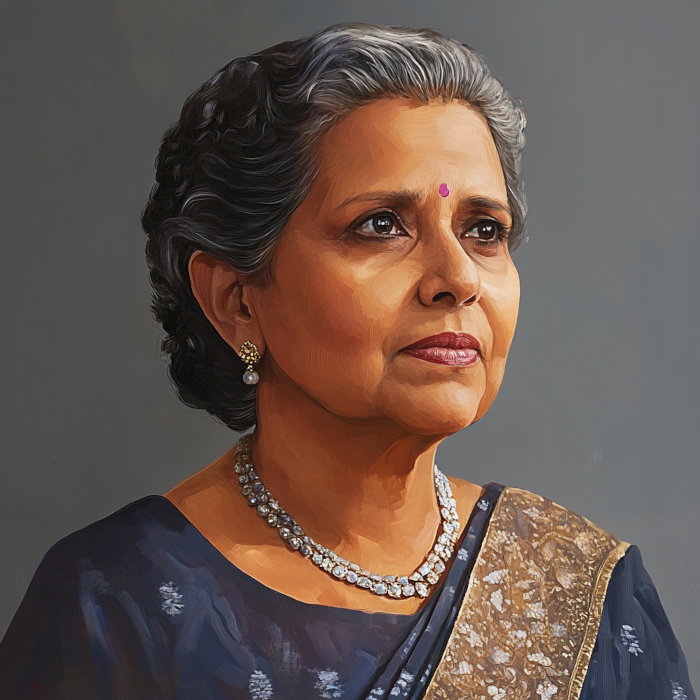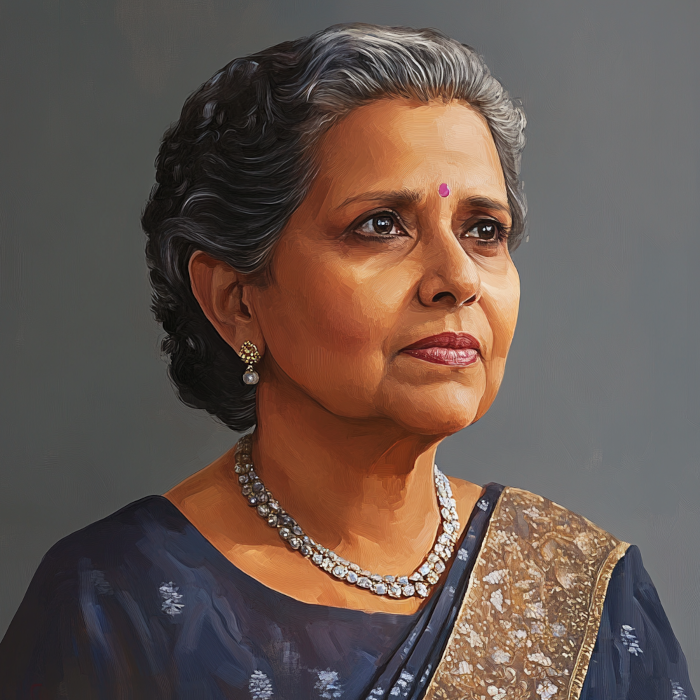


Chandrika Bandaranaike Kumaratunga (born 1945) is a Sri Lankan politician who served as the President of Sri Lanka from 1994 to 2005. She was the country’s first female president and one of the most prominent figures in Sri Lankan politics during the 1990s and early 2000s. Kumaratunga, a member of the influential Bandaranaike family, played a key role in Sri Lanka's political landscape, attempting to negotiate peace during the country’s prolonged civil conflict with the Liberation Tigers of Tamil Eelam (LTTE) while pursuing economic reforms and social welfare programs. Her presidency was marked by efforts to bring about peace, improve the economy, and promote social justice in the face of ongoing challenges posed by the civil war and political opposition.
Birth and Political Family: Chandrika Bandaranaike Kumaratunga was born on June 29, 1945, in Colombo, Sri Lanka, into one of the country's most prominent political families. She is the daughter of S.W.R.D. Bandaranaike, the founder of the Sri Lanka Freedom Party (SLFP) and former prime minister, and Sirimavo Bandaranaike, who became the world's first female prime minister in 1960. Growing up in a political household, Chandrika was exposed to the intricacies of Sri Lankan politics from an early age.
Education: Kumaratunga attended St. Bridget's Convent in Colombo before studying in France, where she pursued a degree in Political Science at the Institute of Political Studies (Sciences Po) in Paris. She also studied development economics at the University of Paris. Her education in Europe exposed her to socialist ideas and global political perspectives, which would influence her own political ideology.
Return to Sri Lanka and Entry into Politics: After completing her studies, Kumaratunga returned to Sri Lanka in the early 1970s. She initially worked on rural development projects, focusing on improving conditions for disadvantaged communities. She married Vijaya Kumaratunga, a popular actor and politician, in 1978. Vijaya was a rising political star and founded the Sri Lanka Mahajana Pakshaya (SLMP), a socialist political party that opposed the ruling United National Party (UNP) government.
Assassination of Vijaya Kumaratunga: In 1988, Chandrika suffered a personal tragedy when her husband, Vijaya Kumaratunga, was assassinated by an extremist faction of the Janatha Vimukthi Peramuna (JVP). His assassination was a turning point in her life and deepened her commitment to public service and political activism.
Joining the SLFP: In the aftermath of her husband's death, Kumaratunga rejoined the Sri Lanka Freedom Party (SLFP), which was led by her mother, Sirimavo Bandaranaike. She quickly rose through the ranks and became a prominent figure within the party, advocating for social justice, economic reform, and peace in the midst of Sri Lanka’s civil war.
Chief Minister of Western Province (1993): In 1993, Kumaratunga was elected as the Chief Minister of the Western Province, a position that helped her gain significant political experience and increased her popularity. Her tenure as chief minister was marked by her efforts to improve infrastructure, healthcare, and education in the province.
Prime Minister and Presidential Election (1994): In August 1994, the SLFP-led People's Alliance (PA) coalition won the parliamentary elections, and Kumaratunga was appointed Prime Minister of Sri Lanka. Later that year, she ran for the presidential election and won by a significant margin, becoming Sri Lanka’s first female president in November 1994. Her victory was seen as a hopeful turning point for Sri Lanka, which had been plagued by civil conflict and economic instability.
Peace Initiatives with the LTTE: One of Kumaratunga’s primary goals as president was to bring an end to the civil conflict between the Sri Lankan government and the Liberation Tigers of Tamil Eelam (LTTE), which sought an independent Tamil state in the north and east of Sri Lanka. Kumaratunga initially pursued a policy of negotiation, offering peace talks with the LTTE and attempting to reach a political solution to the conflict. In 1995, her government and the LTTE agreed to a ceasefire, and peace talks began.
However, the ceasefire was short-lived, and hostilities resumed later that year after the LTTE launched new attacks. Despite her efforts, the peace process faced numerous obstacles, including mistrust between the government and the LTTE, as well as resistance from hardline nationalist factions within the Sinhalese community. Kumaratunga's attempts to devolve power to the Tamil-majority regions through constitutional reform were ultimately unsuccessful due to opposition from within parliament.
Assassination Attempt (1999): In December 1999, during her re-election campaign, Kumaratunga survived an assassination attempt by an LTTE suicide bomber at a rally in Colombo. The attack left her with injuries to her right eye, but she continued her campaign and won the 1999 presidential election, securing a second term in office. The assassination attempt underscored the dangerous environment in which she sought to negotiate peace.
Economic and Social Reforms: During her presidency, Kumaratunga focused on implementing economic and social reforms aimed at improving the quality of life for Sri Lankans. She promoted free-market economic policies while also maintaining a focus on social welfare. Her government invested in infrastructure development, education, and healthcare, and she sought to address poverty and unemployment through various development programs. Despite some progress, her economic policies faced challenges, including budget deficits, corruption, and the impact of the ongoing civil war.
Relations with India and Foreign Policy: Kumaratunga worked to strengthen Sri Lanka’s relations with neighboring India, which had played a complex role in the country’s civil conflict. She sought India's support in mediating the conflict with the LTTE and aimed to foster regional cooperation. Her foreign policy was also marked by efforts to build stronger ties with Western nations and international organizations to secure support for Sri Lanka's development and peace efforts.
Conflict with the Prime Minister: In the early 2000s, Kumaratunga’s presidency was marked by political conflict between her and the United National Party (UNP), led by Ranil Wickremesinghe, who became prime minister in 2001. Wickremesinghe pursued his own peace negotiations with the LTTE, which led to a ceasefire agreement brokered by Norway in 2002. However, the relationship between the president and prime minister was fraught with tension, as the two leaders had different approaches to handling the peace process.
Kumaratunga was critical of Wickremesinghe’s concessions to the LTTE, arguing that they compromised national security. The political rivalry between the president and the prime minister led to a constitutional crisis in 2003, when Kumaratunga used her executive powers to take control of several key ministries, including defense, and suspended parliament. The crisis highlighted the difficulties of cohabitation in a divided government and hindered efforts to achieve lasting peace.
End of Presidency and Legacy: Kumaratunga’s second term ended in 2005, and she was succeeded by Mahinda Rajapaksa, a member of her own party who had served as prime minister. After leaving office, Kumaratunga largely withdrew from active politics, although she remained an influential figure within the SLFP and occasionally voiced her views on political issues.
Attempts at Peace and Reconciliation: Chandrika Kumaratunga’s presidency is often remembered for her attempts to bring about peace in Sri Lanka during a time of deep conflict. Although her peace initiatives with the LTTE ultimately failed, her efforts represented a genuine attempt to find a political solution to a complex and deeply rooted conflict. She was willing to take risks, including devolving power to Tamil-majority areas, in pursuit of peace—an approach that distinguished her from many of her predecessors.
Social and Economic Reforms: Kumaratunga's focus on economic development, poverty alleviation, and social welfare helped improve infrastructure and access to education and healthcare in Sri Lanka. Her commitment to social justice was rooted in the legacy of her parents, both of whom had championed similar causes during their time in power. However, her economic policies faced limitations due to corruption, inefficiency, and the impact of the civil war.
Women in Politics: As the first female president of Sri Lanka and the daughter of the world’s first female prime minister, Kumaratunga broke significant barriers for women in politics. Her leadership helped inspire greater female participation in Sri Lankan public life, and she remains a symbol of women’s empowerment in the region.
Post-Presidential Activities: After leaving office, Kumaratunga continued to advocate for peacebuilding and reconciliation in Sri Lanka. She established the Chandrika Kumaratunga Foundation for National Unity and Reconciliation and worked on initiatives aimed at promoting dialogue between communities. She also served as an advisor to various international organizations on issues related to conflict resolution and social development.
Chandrika Kumaratunga was a pivotal figure in Sri Lankan politics during a time of great turmoil and change. Her presidency was defined by her attempts to negotiate peace in the midst of a brutal civil war, her commitment to social and economic development, and her resilience in the face of personal and political challenges. Despite the obstacles she faced, including an assassination attempt and intense political opposition, Kumaratunga's leadership left an indelible mark on Sri Lanka's history.
Her legacy is one of hope and perseverance in the pursuit of peace and social justice. While her efforts to end the civil war were ultimately unsuccessful, they laid the groundwork for future peace initiatives and demonstrated the importance of seeking a political solution to complex conflicts. Chandrika Kumaratunga remains an influential voice for reconciliation and unity in Sri Lanka, advocating for a more inclusive and peaceful future for all its citizens.

We use cookies
We use cookies and other tracking technologies to improve your browsing experience on our website, to show you personalized content and targeted ads, to analyze our website traffic, and to understand where our visitors are coming from. Privacy Policy.